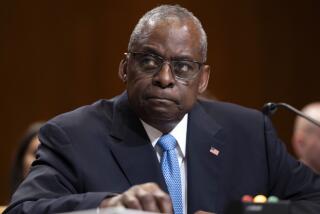U.S. Seeks to Aid Soviet Military : Defense: Counsel to Moscow and the Baltics could include tips on converting the defense industry and reorganizing forces for a democratic society.
WASHINGTON — The Defense Department, struggling to cast aside more than four decades of suspicion, is exploring ways to help the Soviet Union and the newly independent Baltic countries by offering technical and organizational advice to their armed forces.
The Pentagon’s assistance could range from counsel on the conversion of defense industries and tips on how to organize military forces in a democratic society to more sensitive exchanges on nuclear weapons safety and security, officials told The Times.
But despite proddings from Defense Secretary Dick Cheney to begin such consultations quickly, only one long-planned delegation, led by Deputy Defense Secretary Donald J. Atwood, is ready to be sent to the Soviet Union, in early October.
Pentagon officials said that the turmoil of leadership changes in the Soviet military and the prospect of many more to come have made it difficult to initiate meaningful dialogues between the Defense Department and its Soviet and Baltic counterparts. But other observers said that the Pentagon’s deeply ingrained suspicion of the Soviets also has slowed the process.
“The Pentagon is really caught up” in its own ambivalence toward the Soviets, a former defense official said. “They’re still treating Eastern Europe as if they were Communists.”
When it comes to assisting the Soviets, the source added, “it’s one thing for Cheney to lecture from a distance--it’s another thing for the Pentagon to provide support.”
Rep. Les Aspin (D-Wis.), chairman of the House Armed Services Committee, recently proposed the diversion of $1 billion from the Defense Department’s proposed $291-billion 1992 budget to create a “Humanitarian Aid and Stabilization Fund” providing food and medicine to the Soviet people this winter.
But Cheney dismissed Aspin’s proposal in an Aug. 29 speech. In doing so, the defense secretary, who has urged the Soviets to consider reforms that would make the Soviet military more like that of the United States, said he is eager to promote the “demilitarization of the Soviet Union” and “fundamental change in the culture of the society in terms of the role the military plays.”
Cheney added that the control of the Soviet nuclear arsenal, also a subject of past discussions between him and his Soviet counterparts, is “clearly . . . an agenda item . . . a subject that we want to renew.”
Indeed, the militarily sensitive area of nuclear security and safety may be among the first areas in which the United States could offer technical advice to the Soviet Union. Officials said that Secretary of State James A. Baker III will raise the subject during his visit to Moscow, where he is to meet with the new Soviet defense minister, Yevgeny I. Shaposhnikov, next week.
A senior defense official added that the Defense Department “would be pleased” to provide the Soviets and the newly independent republics with advice on operating armed forces and drafting defense budgets in a democracy, under the constraints of parliamentary oversight and civilian leadership.
But while Cheney has broadly outlined his hopes for new consultations, one Pentagon official cautioned that “he is several steps ahead of us.”
Still, the official rejected charges that the Pentagon’s longstanding institutional suspicion of the Soviets is causing any lag. Pentagon planners, he said, have been nearly overwhelmed by the practical challenges of identifying the new leaders and understanding the patchwork of institutions that is emerging in the Soviet Union and in the Baltic republics of Lithuania, Latvia and Estonia.
For now, it appears that Atwood’s trip will become the focus of the Pentagon’s early efforts, officials said.
As originally proposed to the Soviets, Atwood’s visit was to focus exclusively on the conversion of defense industries. But with the race of recent events and the press of Cheney’s interests, officials said they expect Atwood’s agenda to grow.
“We’re going to be talking about a lot of new things,” said a senior defense official involved in the planning of Atwood’s trip. “The Soviets and these republics are going to be reinventing their militaries--reducing their forces, introducing professionalism in the ranks and reconfiguring their defense-industrial sectors. Now that you’re not talking about two ideologically driven powers at each other’s throats, it’s possible to have more of an exchange.”
As the Soviet military remakes itself and the Baltic militaries build themselves from the ground up, Pentagon officials expect that they will be called upon to share their own organizational experiences, officials said.
One official said that the American military’s transition in 1973 from a conscript to a volunteer professional military force is expected to be of considerable interest to the Soviets, since Shaposhnikov has said he would like to explore a similar transition.
In addition, the Defense Department’s senior civilian leaders, in visits throughout Eastern Europe, have been exhorting the Soviet Union’s former satellite states to adopt military command structures that are headed by civilians. That advice is expected to be dusted off and offered again to the Soviet Union and the Baltic nations, officials said.
But while officials said that some in the Pentagon are eager to offer counsel to the Soviet and Baltic armed forces, they said they are far from extending more formal military aid.
But that too may come, as it has with several former adversaries in Eastern Europe, one official said. Though it has been less than a year since the Warsaw Pact was dissolved, the Bush Administration already is extending “international military education and training” funds to Poland, Hungary and Czechoslovakia.
More to Read
Sign up for Essential California
The most important California stories and recommendations in your inbox every morning.
You may occasionally receive promotional content from the Los Angeles Times.











